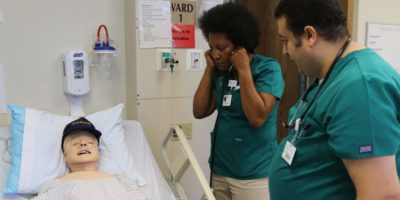

The following is Mary Ann Wolf’s “Final Word” from the Nov. 21, 2020 broadcast of Education Matters: “Career and Technical Education.”
Career and Technical Education (CTE) is designed to empower all students to become successful citizens, workers, and leaders in a global economy. Whether students plan to further their education in colleges, technical schools, through industry certifications, on-the-job training, or pursue careers in the military, CTE can serve as an important step in a pathway toward a successful career.
More than 900,000 students participate in career and technical education programs across North Carolina each year. These students have been able to develop skills both inside and outside of the classroom setting in a variety of different program areas, including agriculture, business, computer science, health science, engineering, and more.
By enabling students to experience career settings as early as middle school, career and technical education is an important tool to help students identify what their passions are early in life so that they can take advantage of time — one of our most precious commodities — and pursue a career path that is right for them.
In a recent article published by EdNC, we learned about Brandi Bragg, who spent a year of studies and $10,000 getting a medical assistant degree only to learn after working in that job that it wasn’t right for her. What she missed in her studies was workplace-based training. She could have been saved that time and money if she had taken part in a career and technical education program that offered her a chance to experience her work environment much sooner.
Today, she is working to make sure other students don’t repeat her mistake, shepherding a regional partnership connecting students to high demand careers in tangible and meaningful ways. In today’s dynamic economy, families often don’t know how to guide their children through learning what kind of career opportunities are available and how students can gain exposure to them.
The Northeast N.C. Career Pathways program steps into the gap to offer those insights and opportunities. As early as sixth grade, students can begin to identify what kind of high demand jobs exist and how they may begin on a path toward achieving success in those careers.
Not only do we need more programs like Northeast N.C. Career Pathways, we also need equitable access to these types of local programs in order for our Career and Technical Education efforts to be successful. Recent federal legislation provides states and local school districts with a critical framework to center equity within Career and Technical Education by ensuring a local needs assessment takes place and critical resources are directed to the right areas.
As a result, states can better align with the local business needs of urban and rural areas. And there’s also been an increased emphasis on recruiting teachers and professionals of color to participate in CTE programs, with the goal of closing equity gaps.
North Carolina through the work of myFutureNC has set a statewide attainment goal that by 2030, 2 million North Carolinians will have a high quality credential or postsecondary degree, and our CTE programs play an important role in making this a reality.
Today, we are faced with challenges to workplace-based learning as we work to mitigate the impact of COVID-19. But as we have all had to adapt, so too have CTE programs, moving meetings online, and finding new ways for students to connect with employers.
A bright side of this extraordinarily difficult time is that as employers have had to pivot in terms of how they do business, CTE can facilitate students’ opportunities to pivot alongside them, and learn new technologies that they will undoubtedly need to be successful in the future.
The future of work and citizenship is filled with opportunity for our children of North Carolina — and it’s incumbent upon us to ensure they are equitably exposed to meaningful career and technical education opportunities early in their academic lives, so that they can put their passions into action.




